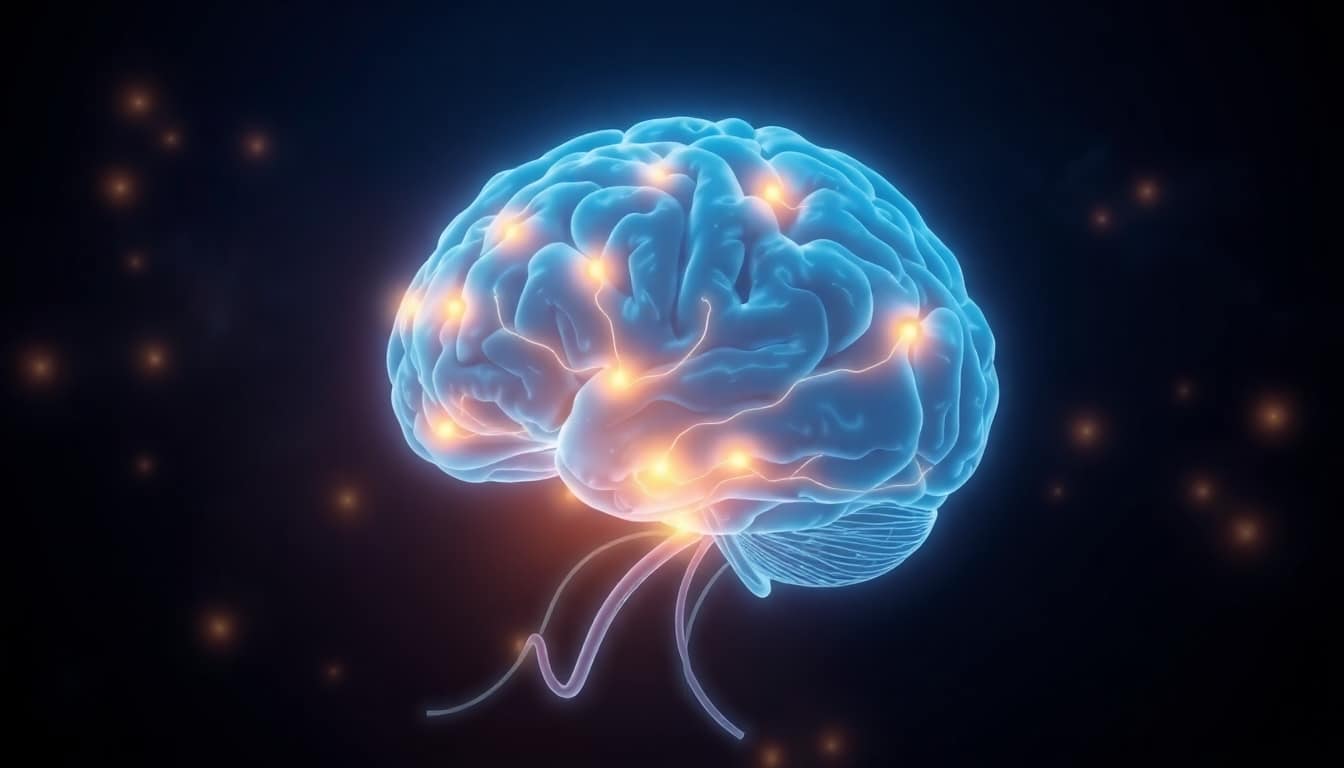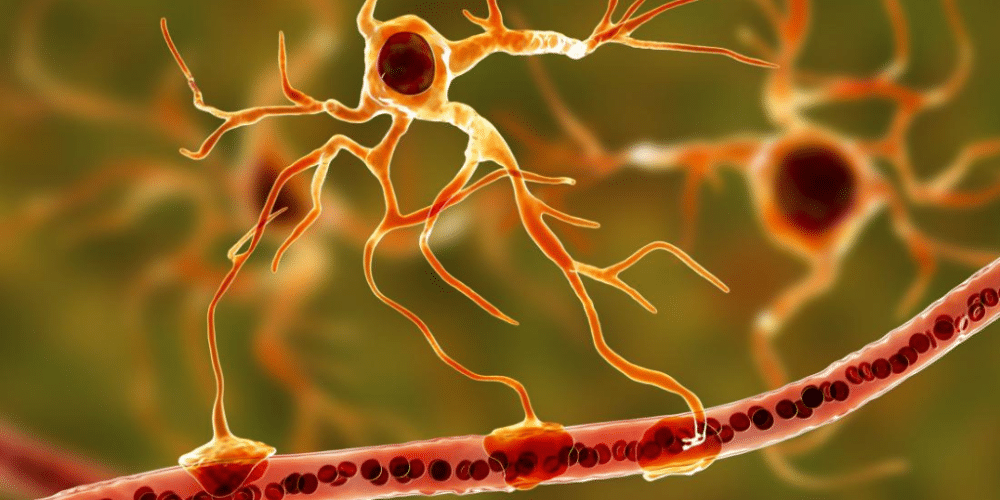
At last — how to detox the brain naturally

Ever feel like your brain is running on dial-up, bogged down by brain fog and slow thinking, even after what you thought was a full night’s sleep? You’re not alone. But what if I told you the culprit might be a crucial, yet little-known, system in your body? It’s called the glymphatic system, and it’s your brain’s very own dedicated cleanup crew. This system is one of the most important and least talked-about players when it comes to your mental clarity, memory, and long-term brain health. It was only discovered in the last couple of decades, so it’s still relatively new to science, but the more we learn, the more we realize just how vital it is.
Think of it this way: throughout the day, your brain is working tirelessly—processing information, managing stress, and running every single system in your body. This hard work creates metabolic waste. Unlike the rest of your body, which uses the lymphatic system to clear out junk, your brain has this specialized glymphatic system. It uses cerebrospinal fluid (CSF) to flush through your brain tissue, washing away toxins, waste products, and even harmful proteins like beta-amyloid, which is famously linked to Alzheimer’s disease. In this article, we’re going to do a deep dive into this fascinating system and, more importantly, explore the simple, natural things you can do every day to support it and keep your mind sharp for years to come.
Key Takeaways

- The Glymphatic System is Your Brain’s Cleanup Crew: It’s a specialized network that uses cerebrospinal fluid to flush out metabolic waste and toxins from the brain.
- Deep Sleep is Non-Negotiable: This system is up to 10 times more active during deep, slow-wave sleep. This is when the real cleaning happens.
- Poor Function Has Consequences: A sluggish glymphatic system can lead to brain fog, poor memory, headaches, and over the long term, may increase the risk for neurodegenerative diseases like Alzheimer’s and Parkinson’s.
- Lifestyle is Foundational: Simple habits like daily movement, good posture (both awake and asleep), and staying hydrated are essential for optimal function.
- Targeted Nutrients Can Help: Specific nutrients, including zinc, curcumin (from turmeric), and omega-3 fatty acids, have been shown to support the processes involved in glymphatic clearance.
7. Prioritize Deep, Restorative Sleep

This is, without a doubt, the most critical factor for a healthy glymphatic system. You can do everything else right, but if your sleep is poor, your brain’s cleaning crew simply can’t do its job effectively. The system is most active during the deepest stage of sleep, known as slow-wave sleep. During this phase, the space between your brain cells can actually expand by up to 60%, allowing the cerebrospinal fluid to flow more freely and wash away significantly more waste. Most adults only spend about 10-20% of their night in this crucial stage, which typically occurs earlier in the night.
This is why both the quality and timing of your sleep matter so much. If you’re staying up too late, waking up frequently, or using sleep aids that suppress deep sleep, you’re robbing your brain of its prime cleaning time. When this happens night after night, toxins and waste products begin to accumulate. To optimize your sleep for glymphatic function, aim for a solid 7 to 9 hours of quality sleep per night. Try to establish a consistent sleep schedule, going to bed and waking up around the same time each day. Aim to be asleep before midnight, as this aligns better with your body’s natural circadian rhythm and maximizes your chances of getting that restorative, early-night slow-wave sleep.
6. Get Your Body Moving Daily

Your circulatory system has a powerful pump: the heart. Your lymphatic system, however, does not. It relies on the contraction of your muscles to move fluid around. The glymphatic system is similar in that it benefits immensely from physical movement. Regular exercise increases overall blood flow, including cerebral blood flow, which helps power the entire process. The pulsing of your arteries is one of the forces that helps push cerebrospinal fluid through the brain, so a healthy cardiovascular system directly supports brain detox.
You don’t need to become a marathon runner to reap the benefits. Consistent, moderate activity is key. Things like brisk walking, jogging, swimming, or cycling are all fantastic. Even gentler forms of movement like yoga and tai chi are incredibly beneficial, as they promote circulation and fluid movement throughout the body. Some have even suggested rebounding on a mini-trampoline to stimulate lymph flow. Another practice you might consider is dry brushing. By brushing your skin with a natural bristle brush before a shower, you can help stimulate the surface-level lymphatic vessels. Since the glymphatic system ultimately drains into the body’s main lymphatic system, supporting one helps the other.
5. Optimize Your Posture (Day and Night)

Your posture has a surprisingly significant impact on the flow of fluids in and out of your head. This affects your glymphatic system both while you’re sleeping and while you’re awake. Let’s start with your sleeping posture. Emerging research, primarily from rodent studies, suggests that sleeping on your side is the most efficient position for glymphatic clearance compared to sleeping on your back or stomach. Researchers believe this lateral position improves the flow of CSF and reduces resistance in the drainage pathways. While more human research is needed, it’s an interesting finding. If you’re already a side sleeper, great! If not, you could try it, but don’t force it. If sleeping in an unnatural position causes you stress or disrupts your sleep, it will defeat the purpose. Quality sleep is always the top priority.
Your daytime posture is just as important. Many of us spend hours hunched over a computer or phone, leading to a condition often called “tech neck.” This forward head posture can create tension and compression in your cervical spine, potentially impeding the healthy circulation of cerebrospinal fluid between the brain and spinal cord. To counteract this, make a conscious effort to keep your head in a neutral position, with your ears aligned over your shoulders. Take frequent breaks from sitting to stand up, stretch your neck and shoulders, and walk around. Avoiding long periods of slouching helps ensure the channels for fluid exchange remain open and unobstructed.
4. Stay Consistently Hydrated

This is one of the simplest yet most overlooked aspects of brain health. What is cerebrospinal fluid made of? Mostly water. If you are dehydrated, your body doesn’t have the raw material it needs to produce an adequate amount of CSF. This means the entire glymphatic flushing mechanism can become sluggish and less effective. Proper hydration is the foundation upon which this system operates.
Don’t wait until you feel thirsty to drink, as thirst is often a sign that you’re already mildly dehydrated. Keep a water bottle with you throughout the day and sip on it consistently. The exact amount you need can vary based on your activity level, climate, and individual body, but a general goal is to drink enough so that your urine is a pale, straw-like color. Remember that other fluids and water-rich foods like fruits and vegetables also contribute to your overall hydration status. Making sure you’re well-hydrated is a simple, free, and powerful way to support your brain’s daily detox.
3. Boost Your Zinc Levels

Now let’s move into some targeted nutrient support. While research on specific nutrients for the glymphatic system is still in its early stages, some very promising connections are being made. One of the most significant is with the mineral zinc. A 2021 study found a direct positive correlation between serum zinc levels and glymphatic system activity in humans. This suggests that having adequate zinc is necessary for your brain’s waste clearance to function optimally.
This is fantastic news because zinc is a powerhouse mineral for overall health, known for supporting the immune system and acting as a detoxifying agent that can help clear toxic heavy metals. Unfortunately, much like magnesium, many people have suboptimal or borderline deficient zinc levels, especially those following vegan or vegetarian diets, as the most bioavailable sources are animal-based. You can find zinc in foods like oysters, beef, crab, pumpkin seeds, and lentils. If you suspect you might be low, you may consider supplementation, but it’s always best to consult with a healthcare provider.
2. Harness the Power of Curcumin and Omega-3s

Two other nutrients that show immense promise for supporting the glymphatic system are curcumin and omega-3 fatty acids. Curcumin is the active, anti-inflammatory compound found in the spice turmeric. It’s a well-researched antioxidant that is famous for its brain-protective effects. While direct research on curcumin and the glymphatic system is limited, we know that it helps the brain clear out those sticky amyloid plaques—the very type of waste the glymphatic system is designed to remove. It stands to reason that by reducing neuroinflammation and aiding in waste removal, curcumin creates a healthier environment for the glymphatic system to do its job.
Similarly, omega-3 fatty acids, particularly DHA and EPA found in fatty fish, are crucial for brain health. They are powerful anti-inflammatories and are essential for the health of brain cell membranes and blood vessels. Like curcumin, omega-3s have been shown to help with the clearance of amyloid plaques and improve the health of the brain’s microvasculature. Since the glymphatic system relies on healthy blood vessels, ensuring you have enough omega-3s is key. Most modern diets are severely lacking in these essential fats, so focus on eating fatty fish like salmon, mackerel, and sardines a few times a week, or consider a high-quality fish or algae oil supplement.
1. Consider Advanced Support: Photobiomodulation

For those looking to explore more cutting-edge therapies, photobiomodulation—also known as red and near-infrared light therapy—is gaining attention for its potential to support the glymphatic system. Early research, mostly from animal models, indicates that this type of light therapy may enhance glymphatic clearance by improving the function of a key protein called aquaporin-4 (AQP4). These are the water channels that are essential for driving fluid movement through the brain.
The theory is that by improving cerebral blood flow, boosting cellular energy production, and reducing oxidative stress, near-infrared light creates an ideal environment for glymphatic drainage to work more efficiently. While more human studies are definitely needed, the initial findings are very promising for a non-invasive way to boost brain health. Home-use devices are becoming more accessible, but a word of caution is warranted. It’s generally advised not to shine these powerful lights directly at your head or face, as it can be too intense. Instead, applying the light to your body can still provide systemic benefits that support brain health.
Conclusion
The glymphatic system is one of the most fascinating and important discoveries in neuroscience in recent memory. It’s your brain’s built-in, overnight cleaning crew, working tirelessly while you sleep to keep your mind clear and protect you from long-term decline. As we’ve seen, supporting this system isn’t about a magic pill; it’s about reinforcing the foundations of a healthy lifestyle that you should be focusing on anyway. By prioritizing deep sleep, staying active and hydrated, maintaining good posture, and incorporating brain-supportive nutrients like zinc, curcumin, and omega-3s, you give your brain the tools it needs to thrive. Taking care of your glymphatic system is a direct investment in a sharper, healthier, and more resilient mind for the future.
News in the same category


Dogs Able to Sniff Out Parkinson’s Before Symptoms Appear

14 hidden causes of tingling feet (and what to do)

5 Blood Clot Facts Doctors Want You to Know

8 Foods That Help Lower Your Cholesterol

6 Harmful Foods That Weaken Calcium Levels

How to Use Castor Oil to Regrow Eyelashes and Eyebrows

Scientifically Proven Health Benefits of Avocado and Avocado Seeds

Experts Say They’ve Pinpointed the Cause of Autism—And It Could Lead to New Treatments

Scientists Say Cancer Can Now Be Detected Years in Advance with Simple Blood Test

Final straw that led to billionaire CEO's desperate escape from Japan inside 3ft box

10 Early Warning Signs Your Blood Sugar Is Way Too High

If Your Legs Cramp at Night You Need to Know This Immediately

Warning Signs Your Body Is Full of Parasites and How to Effectively Eliminate Them Naturally

Warning Signs of a Parasite Infection And How to Eliminate It for Good

What Raw Garlic Can Do for Your Health Is Truly Unbelievable

Diabetes Tied to Slower Brain Recovery After TBI

Neuropathic Pruritus Has High Comorbidity Burden, Varied Treatment Responses
News Post

Eating More Cruciferous Vegetables May Cut Colon Cancer Risk

Dogs Able to Sniff Out Parkinson’s Before Symptoms Appear

14 hidden causes of tingling feet (and what to do)

5 Blood Clot Facts Doctors Want You to Know

8 Foods That Help Lower Your Cholesterol

6 Harmful Foods That Weaken Calcium Levels

8 Common Reasons For Waking Up at Night

How to Use Castor Oil to Regrow Eyelashes and Eyebrows

Scientifically Proven Health Benefits of Avocado and Avocado Seeds

Experts Say They’ve Pinpointed the Cause of Autism—And It Could Lead to New Treatments

Scientists Say Cancer Can Now Be Detected Years in Advance with Simple Blood Test

You Can Adopt Puppies That Were ‘Too Friendly’ to Become Police Dogs

A Nigerian Scientist Developed a High-Tech Cancer-Detecting Goggles That Help Surgeons Spot Cancer Cells More Accurately.

Final straw that led to billionaire CEO's desperate escape from Japan inside 3ft box

Mutant deer with horrifying tumor-like bubbles showing signs of widespread disease spotted in US states

'Frankenstein' creature that hasn't had s3x in 80,000,000 years in almost completely indestructible

Scientists discover ultra-massive 'blob' in space with a mass of 36,000,000,000 suns

When a Washing Machine Shows 7kg, 8kg, or 10kg, Is That the Weight of Dry or Wet Clothes? The Real Meaning Behind These Numbers Is Something That Few People Know
